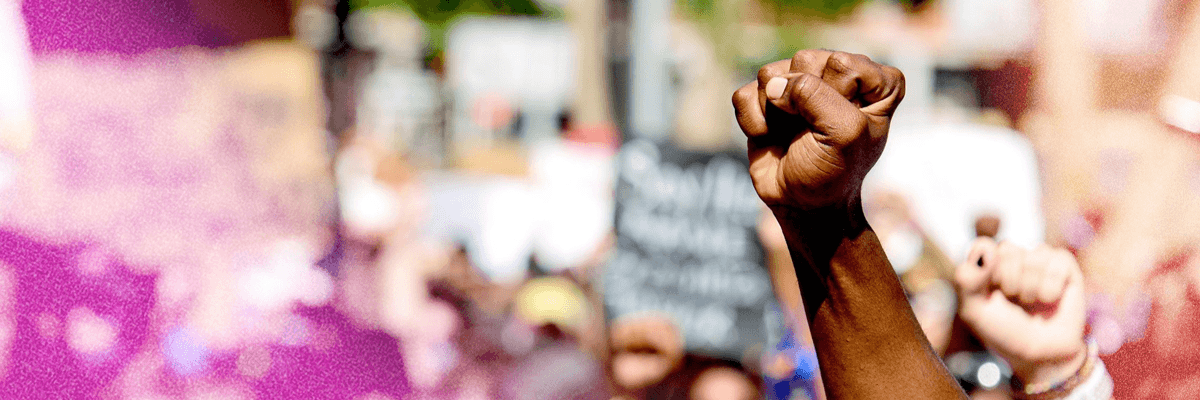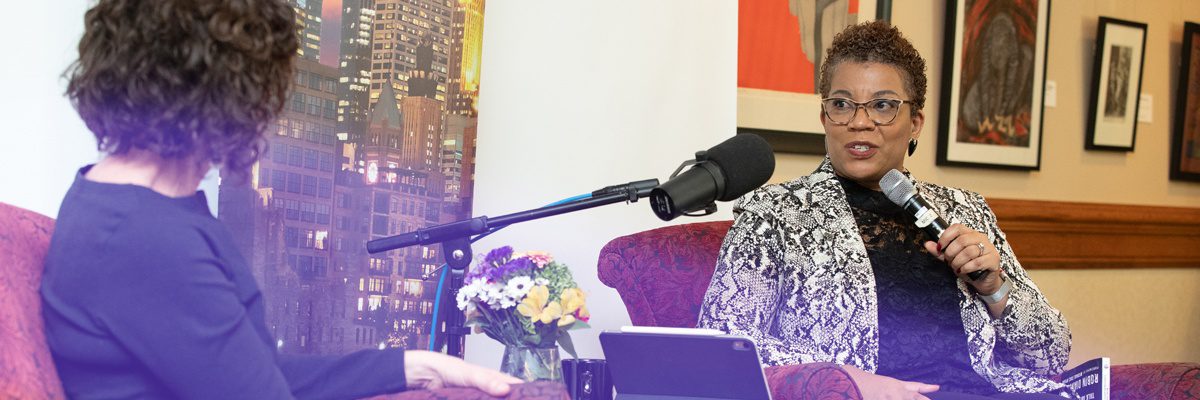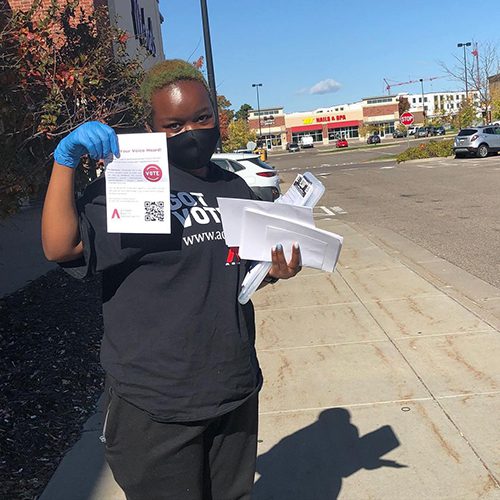The Stark
Truth We Face

At first I wrote, “Once I got over the shock of seeing rampaging protesters in the halls of the Capitol…” And then I stopped. No, we should never, ever get over that shock, and we have to use our anger to act. This cannot happen ever again.
In fact, our outrage should grow as we learn more each day about how unprepared the seat of our government was on that day, especially in light of how much was known in advance. In a building that is all about diversity of opinion, generations of American leaders have debated our toughest issues uninterrupted—and then, last week, an armed mob tried to overturn an election.
It is crucial to get to the bottom of what happened, find out who was involved, and deliver serious consequences. It would, however, be a mistake to believe this is about one incident, and an even bigger mistake to believe we can just address this in isolation and move on.
This shameful incident was years, decades, and generations in the making. While its causes and implications go well beyond the scope of the Minneapolis Foundation, it has some direct intersections with our work that make our efforts even more urgent:

Start with our work on Criminal Justice Reform:
We are committed to leading reform of a deeply inequitable criminal justice system. This inequity was on clear display during the Capitol rampage, where the low-key security that met the largely White crowd bore little resemblance to the waves of police in combat gear and extreme use of force we have seen at diverse protests for racial justice. Had that crowd been largely Black, do you think that so many would have been able to simply walk away after violently breaching our seat of government?
These inequities are seen at every step of our criminal justice system, and have been for decades. Throughout our history and up to today, we see individuals who are duty-bound to protect safety and equality violating their oaths—from a Capitol guard opening a gate for a mob, to an officer with his knee on George Floyd’s neck, to a judge with a pattern of imposing deeply inequitable sentences on people of color.
For two years, the Minneapolis Foundation has been deeply immersed in criminal justice reform, working with many others in our community to dismantle these racial inequities. Each of the steps we take is focused on driving long-term systems change and mobilizing our partners to do more.
Consider our work on voter engagement and other forms of civic participation:
We believe the more people at the table, the better the decision. That means taking intentional action to include those who have not had access to decision-making tables. Our new Strategic Framework takes this a step forward: Our approach to grantmaking will not be determined within our offices but, instead, in a two-way partnership with those in the community.
We have put these values into action for many years, leading community foundations around the country in funding civic engagement with an equity lens. In the past decade, we have invested in efforts to increase voter turnout, encourage more women and people of color to run for office, empower parents and students to get involved in school decision-making, ensure fair and accurate Census counts, and much more. We are committed to ensuring that everyone—but especially underserved and underestimated communities—has access to the tools and resources they need to participate in our democracy.
All this, and more, demonstrates the Foundation stands with those who are disenfranchised. That does not include those who stormed the Capitol with claims of a “stolen election” that were proven wrong by 60 legal rulings, every state legislature, and more. It does mean we have to be even more vocal about reforms to democracy that make it easier to vote.
It is noteworthy that the insurrection to overturn the election came the morning after the runoff vote in Georgia, a state where two years ago state elections were riddled with voter suppression of Black voters that was reminiscent of the worst days of Jim Crow. After those elections, grassroots organizations in Georgia didn’t give up but, instead, doubled down on engaging disenfranchised voters. Those voters turned out in record numbers last week. While much of that work was partisan and the voter engagement work we have supported is strictly nonpartisan, one thing we have in common with organizers in Georgia is a belief that the best way to get underrepresented people to vote is to work with the grassroots organizations closest to community. That has been central to the Minneapolis Foundation’s voter engagement investments, as well as the work we funded to support Minnesota’s nation-leading participation in the 2020 Census.

Recognize that change is personal:
The Minneapolis Foundation and the donors whose resources we steward recognize the importance of funding community change, and we are proud that the amount of money flowing from our office into the community has doubled in the past five years, to more than $114 million last year. Money alone can’t make change, so you will also hear us talking about using more “impact levers”—advocacy, research, convening, and more.
The most powerful impact lever available to each of us is the opportunity to deepen our own understanding with the goal of bringing about personal change. This is the goal of our Conversations with Chanda series, which through podcasts and events exposes us to some of the country’s most provocative voices to raise our consciousness, hear directly from those closest to the challenges we face, and relearn our history, which far too often has masked deep inequities that have existed for generations.
We will have even more “Conversations with Chanda” in the coming year, and as soon as we can safely do so, we will return to hosting in-person events where each of us can connect with others in the spirit of learning even more together.
As I watched angry crowds storming our Capitol with so many signs of hate—Confederate flags, grotesquely anti-Semitic and racist shirts and signs—I thought a lot about the lessons I’ve learned and the people I’ve been introduced to through “Conversations with Chanda” and other work at the Foundation. Those lessons, about our society’s intolerable racism against people of color, make it incomprehensible to me that anyone in America today can believe or spread such hateful messages.
How does that happen? I recognize that in complex times, with complex challenges, there will always be people attracted to the simple answer that you are the victim and it’s someone else’s fault. That is especially true when that simple answer allows White Americans to avoid confronting the deep racism at the core of so much of our country’s history.
The Minneapolis Foundation will not be giving you simple answers to complex problems. I can promise you there will be parts of our “Conversations with Chanda,” and much of our work, that deliver uncomfortable truths. That’s exactly why this work is so important right now.
A week ago—for escapism, I thought—I started reading Charles King’s “Gods of the Upper Air” about Margaret Mead and a group of other anthropologists a century ago. Suddenly I was right back in the issues we face today as I read about this group’s revolutionary work disproving the widely-believed premise that Whites used to “prove” they were smarter than Blacks, and which one culture after the other around the globe used to assert its own superiority over others.
The book reminded me that deeply embedded values of race and power do not have simple answers or shortcuts. One path, however, comes through one of the core values of our new Strategic Framework:
Proximity Matters.
Proximity has meant everything to me in the largest body of my work over the past 15 years: Building pipelines for young people of color to join the workforce. Since starting the Step Up summer jobs program 13 years ago, I have come to know many remarkable emerging leaders among the 20,000 young people from every race and culture in our rapidly diversifying community. I met even more in the seven years when I held annual forums with every ninth-grade class in every Minneapolis school. I met more still in helping to start the Urban Scholars program of public-sector internships for college-age young people of color, and more through the Power of You, which provides two years of study at Minneapolis Community & Technical College.
Having seen tens of thousands of inspirational young leaders of color, I am baffled when employers say they “can’t find enough good candidates of color.” Two years ago, the Minneapolis Foundation decided to do something about that: In partnership with the Itasca Group, we launched ConnextMSP, an “alumni association” for graduates of Step Up and similar programs. We incubated ConnextMSP as it grew and celebrated last year when it made the transition to its new home at GreaterMSP, which will help our region’s leading employers hire these extraordinary young people.
Seeing firsthand what happens when doors of opportunity open to this diverse generation of rising leaders gives me an inspiring picture of what our shared tomorrow looks like. Just imagine how much more powerful our workforce will be with the complexity of perspectives that this far more diverse generation will bring, with their many languages and cultural skills. Imagine what our future holds with so many more people fully empowered to realize their greatest potential.
I hold that unbelievably uplifting picture of tomorrow right next to the enraging picture of mobs swarming the Capitol, because they are part of the same whole. They show us the stark choice we face.
We have stood at this point before in our history; when we could have moved boldly to a better place, but didn’t do enough to challenge those pushing the lie of victimhood, pointing fingers at others instead of looking in the mirror to face complex truths. That cannot happen again. Progress is possible, and in spite of each backlash, each wave of history has brought us closer.
If you don’t believe that, remember this:
At Atlanta’s Ebenezer Baptist Church—where Dr. Martin Luther King, Jr. used to preach that “the arc of the moral universe is long, but it bends toward justice”—the Senior Pastor has been a descendant of slaves, whose mother picked other people’s cotton. In a few days, he will walk into that same Capitol building—built by slaves and ransacked by terrorists—and Senator-elect Raphael Warnock will take the oath to represent Georgia, the heart of the old Confederacy.


